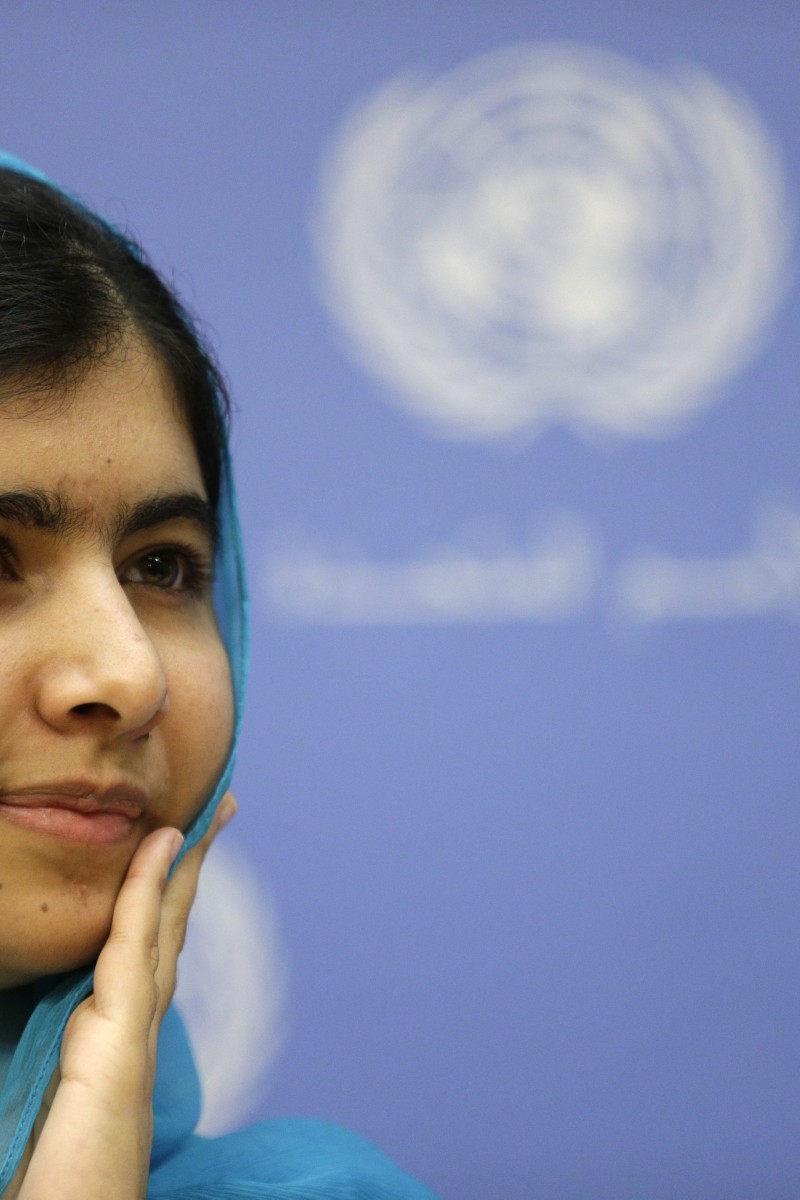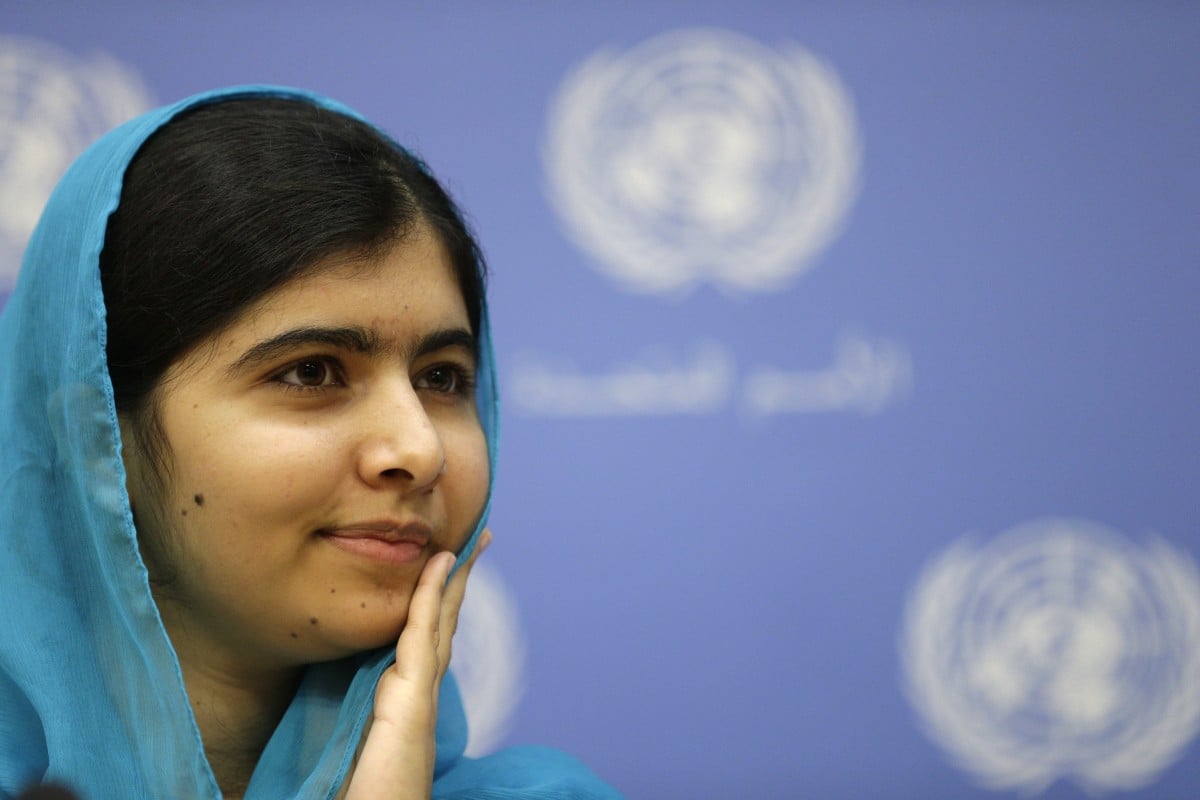
Pakistani activist continues to reconcile her extraordinary place in the spotlight with her very normal teenage existence in central England, as a new documentary shows
 Malala speaks at a press conference on the sidelines of the United Nations Sustainable Development Summit.
Malala speaks at a press conference on the sidelines of the United Nations Sustainable Development Summit.This is evidently no ordinary interview. I've been told to arrive at a Mayfair hotel, where I will be driven to an undisclosed location - a small production office in northwest London. Burly security men are evident as soon as I arrive. But then perhaps it's no surprise. I am here to meet Malala Yousafzai, the 18-year-old Pakistani who became a target of the Taliban after she spoke out about girls' rights for education.
Raised in the lush Swat Valley, in the country's Northwest Frontier province, Malala was yet to hit her teens when she was encouraged by her father to write a blog for the BBC under a pseudonym about life under Taliban rule.
Gradually, she began to speak in public until, on October 9, 2012, she was attacked by a gunman. He fired three shots - one hitting the left side of her forehead, travelling the length of her face and into her shoulder.
Miraculously, she survived. Despite widespread condemnation of the attack, the Taliban vowed to kill Malala and her father, Ziauddin.
Today, wrapped in a red and gold dupatta, an aura of gentle defiance and determination radiates from her, as she sits quietly in a dimly lit room.
"The little fear I had of death, of being killed, that is gone now," she says. "I strongly believe that no one can stop me." The issues she campaigns for are too important, she says. "I could stop. Or I could say, 'No, you have seen the worst moment in your life and you have seen the worst that you could ever imagine. Now you choose to continue.' And I chose to continue."
This explains the security for the girl one newspaper dubbed "the most famous teenager in the world". In the past three years, Malala has been in Time magazine's "The 100 Most Influential People in the World" list. She's spoken at the UN and collected the 2014 Nobel Peace Prize - the youngest person ever to do so. As for her celebrity friends, Angelina Jolie drops in for tea (amusing, as Malala has a crush on Brad Pitt) and Madonna has dedicated a song to her.
Now she's the star of a new documentary, He Named Me Malala, an intimate family portrait by Davis Guggenheim, who previously made the Al Gore eco-documentary An Inconvenient Truth.
"The movie has become part of the journey of my life over the past two years," says Malala, speaking in soft, measured and earnest tones. If anything, the film demonstrates what is clear from meeting her, that she has two very disparate sides to her life: the schoolgirl and the saviour.
"Right now, it seems like I have two different lives," she nods. "One, a girl at home fighting with her brothers, living like a normal girl, going to school, doing homework, exams and all these things. And then there is another girl who speaks out, speaks for education.
"So it seems like two different lives but the reality is it's just one girl doing all this. And I'm trying my best every day to connect these two together and consider it a part of my life."
That can hardly be easy, what with travelling to such far-flung countries as Jordan, Kenya and Nigeria, promoting girls' education through her campaign, The Malala Fund.
Back home, she's had her GCSE exams to contend with; she says that the pals she's made in Birmingham, England, have helped her study.
"I've got very good friends. They consider me a very normal girl - just Malala to them. The other part of my life, we usually don't talk about it."
Still, her new friends in England must be curious about this shy girl, wise beyond her years, who has become a symbol for peaceful resistance.
What do they think about her meeting world leaders like US President Obama?
"They do talk about [me] meeting David Beckham. Not about Obama." Malala met the former England footballer when he presented her with an award. "I knew he was a footballer but I did not know how famous he was." These days, even Beckham's global fame might be overshadowed by Malala.
As the film shows, Malala has been living in Birmingham since the attack - after she was moved there to receive specialised treatment.
During the shooting, on a school bus, the bullet drove fragments into her brain. Her left eardrum was shattered and a facial nerve completely severed, leading to paralysis down the left side of her face. A portion of her skull was removed to alleviate swelling of the brain; it took months for her to fully recuperate.
We touch on her life in Birmingham now. "In the beginning it was quite difficult," she says. "It was just a sudden change in our way of life, especially for my mother. She could not speak English. And for her, there was the problem of communicating." And the tradition is different - how you make friends, how you talk to them. Everything."
Now, after almost three years, Malala has adjusted to her new city.
"I like the traffic system here," she says, half-joking. "It's very well organised."
At home, she has two "annoying" younger brothers, Khushal and Atal; the sibling rivalry glimpsed in the film is yet another reminder that Malala is still young herself.
"It is hard for them, being very little when they saw this sudden change in our lives," she concedes. "It's hard to imagine your sister being attacked. But ultimately, they're just brothers. Their interests are in computer games such as Minecraft, all these things. And all of their attention is towards that."
When Malala first arrived in school in England, police had to undertake a security sweep of the area.
Does she still get scared for her safety? "I think that it's part of human nature to get scared," she reasons. "When I was in Swat Valley, there were times when I was scared. I was scared to go to school because of the fear that someone could throw acid on my face, or the terrorists can flog me because I'm going to school and doing something against what they want."
Her courage, she says, comes from her father, who had encouraged the anonymous blog, "Diary of a Pakistani Schoolgirl".
"My father inspired me, the way he spoke out for women's rights and girls' education."
A social and educational activist, Ziauddin was not only a teacher but the founder of a chain of schools in the Swat Valley, which was controlled by the Taliban between 2007 and 2009.
A studious, hard-working pupil, left shocked by the Taliban's denial of female rights to schooling, Malala didn't need much encouragement to pen her thoughts, she says.
"It was due to the circumstances I faced. If there was no terrorism in Swat Valley, if I could go to school, then I wouldn't have to do it. There would be no need. But I stood up because there was need; there was need for someone to speak up, for someone to bring the change, for someone to talk about peace and to talk about education."
This summer, marking her 18th birthday, Malala opened a school for Syrian refugee girls in Lebanon. She was shocked, though perhaps not surprised, by what she saw.
"As a refugee, it's not easy to live in this situation when you have no hope for school or for the future. So it's important the world leaders give it attention and focus on it. If they don't focus on it, this war will continue and more and more people will become refugees, and more and more children will get deprived of education."
With 66 million girls estimated to be without schooling around the globe, Malala talks of her "mission" with the zeal of a preacher. It's infectious, never sanctimonious.
"If I remain silent, these things are never going to change. That's why I continued it. Right now, I am very optimistic. I do care about things. I do ask questions. I do think before making any decision. But I'm optimistic about the future, that things will change, as things have in the past." She pauses, briefly. "I'm quite positive."
In the short term, her dreams are all about returning to Swat Valley. Her family have not been back since her attack.
"I'm hoping that we will be able to go to Pakistan very soon and I'm very excited about that. I miss my country; being away from it for almost three years is very hard, very difficult. We came to the UK not through our own choice but it was circumstances that forced us to come here. So it's very difficult to live in a situation where it's not your own choice."
First, she has her own education to complete. She has already visited top-tier universities Oxford and Stanford, though remains undecided about what to study. "I haven't taken a clear decision yet. I still need to discover more opportunities," she says.
But one thing is abundantly clear. When she's finished, she wants to go back to Pakistan to work. "That has been my dream for years and years - to help my country, to see every child in my country get quality education." You're left in no doubt she will.